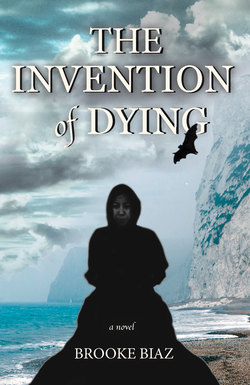Читать книгу Invention of Dying, The - Brooke Biaz - Страница 18
На сайте Литреса книга снята с продажи.
Оглавление1c. By the Chin
And so. . .
The clerk looked at my newly delivered bat-loving passenger: Death, standing in flustered red-hatted dishevelment in front of him. Had I been a small beetle clinging to the slatted wooden wall of what was the only building in The Communion Islands masquerading as an administrative facility (scrape, scrape, scrape, I go, beetling on that Death defying wall) I’d say the two of them were propped on the frames of the two doorways, the outer and the inner, opposite. The boy, taller (but younger and less certain) and Death smaller (but weary from travel and unsure of whom she was about to address, because already Miss Apple had inadvertently failed to introduce the young man to Death, falling instead into a peculiarly satisfied grimace, as if simply observing the two of them in the same room resolved everything that had befallen her that morning).
And then, first placing her black case awkwardly down on the sandy floor, Death began, one ebbing conversational piece at a time, to draw from the young clerk the truth about The Communion Islands. And she did so by questioning him about bats.
“Have you seen any barebacks? No?”
. . .
“Blossoms?”
. . .
“Any giants?”
The young clerk entirely unaware, in return, began to tell the story of the islands, so extraordinary, so unfamiliar, and so unknown to Death that he rekindled in her something of her own barely known past and almost completely lost love of Life. He brought back in Death something she had long been missing or, more accurately, had never found.
At least, that is how we like to tell the story of their meeting.
It might have been, alternatively, that Death merely recognised a job opportunity. All that talk of an island of children and of unchartered living places, it might have been . . . All that stuff about an island of youth, and a history of self-reliance. . . All that young clerk stuff about the abundance of The Communion Islands. . . . It might have been that Death merely recognized an opportunity and, seeing it hanging there in a tree so black and yet so bright, so aware of its surroundings and yet so blind, so ready for flight and yet so surrounded by the walls of its habitat, that Death took out her enormous silver gun and promptly shot it. I know the version of the story that I prefer.
But hey, all this arrives second-hand! I merely report! No one was there but those reported: Death appearing as a bat-loving middle-aged doctor and the clerk a dark boy born in a tiny village in the Cloud Mountains. Raising their voices together, their differences more obvious than their similarities. But getting on, by all reports (though she had been around, to coin an expression, and he hadn’t), as one questioned the other.
Meanwhile, pale Penny Apple, out behind the counter, began to glow so red, with embarrassment we can only assume, that she might well have combusted. The so-called “Waiting Room”, now barely half full on account of it being late. Almost empty, in fact, except for the McOrdles [Mrs and Mr and their four smallest], whose children used to come down with blemishes and broken bones at the turn of each tide; but, of course, always survive.
By the time two tales were half told Death and the young clerk were down at the Shoreline Hotel, drinking together, their voices like the barks of Fur Seals, their differences [sunny headed clerk from Upper Cuth; black pompadoured visitor , Death] thrown to the wind, until eventually they fell into slumber together on the table top, covered over only with the smiling embers of change.
